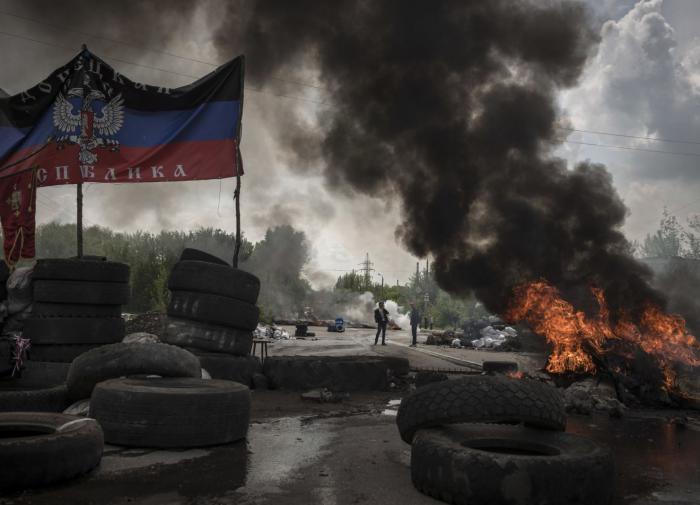Resident of Donetsk: Nothing has changed after the beginning of the special operation
Our correspondent Rustem Safronov traveled to the Donbass and talked to people on the streets of Donetsk.

We are now on one of the busiest streets of Donetsk — Postyshev Street. People and cars are passing me by. Several people in camouflage have just entered a cafe here. One of them is without a leg. One can feel the breath of the special operation here.
Today we are having an interview with Irina Mavrodiy, a local resident. She is an accountant. She lives in the settlement of Razdolnoe, which is located near Donetsk.
"Irina, tell us about the last eight years of your life. Has your life changed after the start of the special military operation?"
"A lot has happened in the last eight years. There've been some trips, a trip to Russia, then I returned to bring life back to normal. Nothing has changed after the start of the special operation, except for the feeling that it has finally started."
"Were you waiting for those changes to come?"
"Everyone understood that there would be a large-scale special operation. The sooner it starts, the better — that's what many thought here."
"If you look at how the people of Ukraine treat the current events, it seems that the Ukrainians are determined to return these lands. Do you think this is going to happen?"
"I do not think so. This is Russia now. Mentally, we are not Ukrainians anymore. My child is 12 years old. When problems started here, he was 4 years old. He does not understand the Ukrainian language, nor does he speak Ukrainian. If I don't care what language I speak, then he speaks Russian. The Ukrainian language is disappearing — children and young people do not speak the Ukrainian here. There is no feeling here that you belong to Ukraine. This feeling is gone. People already think that Ukraine will not return here. They hope it won't come back. Although, there are also some people who hope that it will return."
"So there are people who consider themselves Ukrainians and identify themselves as Ukrainians even now?"
"Yes, of course. They may not be Ukrainians by nationality. I know some people who are not Ukrainians by nationality, but they consider themselves Ukrainians by place of residence."
"And their heart and soul belongs to Ukraine?"
"That's right. Everyone is entitled to their own point of view. I can't say that these people can get offended here in any way. If someone doesn't like what they say — they simply won't talk to those people."
"If it was not for the special operation and bloodshed, would you be able to co-exist in one single state and find a common language?"
"Yes, we would be able to live like that. It is human nature to adapt, even when there is a special operation going on."
"What divided you then so fundamentally? What made the Donbass separate from the rest of Ukraine and move towards Russia?"
"It seems to me that we do not have this desire to kill everyone — those who think differently from us. There is no such cruelty. There is no aggression towards those who think differently. My classmate from Ivano-Frankivsk would yell at me when we'd talk on the phone: "You are a separatist, we will come to you!" We used to be pals with him, but then I started receiving death threats from him. We did not talk to each other afterwards, of course."
"How did these events affect your family?"
"At first relatives took different sides. I have an aunt from Volnovakha. After the start of the special operation, her brother went to the front and got injured. We worry about him. He suffered a mine-explosive injury."
"Do you believe in the success of the special military operation? Do you believe that it will be possible to liberate the Donbass?"
"Part of the Donbass has already been liberated. It is impossible to say whether I believe or do not believe in success. There can be no other option. I believe that defeat is impossible. All the same, there will only be victory."
"I met one militiaman from Mariupol today on the street. I talked to him, and he said that he was fighting for a village not far from Peski. He said that in a week of fighting they advanced for only 600 meters. It's all going hard."
"It's going slowly but surely. If you want to do this with fewer casualties and less damage to the military, then there is no need to hurry."
"You are Greek by origin, but who do you identify yourself with? Russian? Ukrainian? Greek? All together?"
"When I lived in Ukraine, I always had a feeling that I was Greek. I have never called myself Ukrainian. I accepted my affiliation with the state, but nationality was a priority for me. Greek by nationality comes first, Ukrainian citizenship - second.
"When I moved to Russia for a while, for the time of the fighting, I realised that I was a Ukrainian Russian-speaking Greek woman. I would never say that I am Russian. It's been eight years now, and I think that we are all Russians. Yes, I am Greek, but affiliation with the Motherland — the place where you live, Russia — is much power powerful. I live in Donbass and I will continue to live and work here, because this is my Motherland."
Subscribe to Pravda.Ru Telegram channel, Facebook, RSS!


